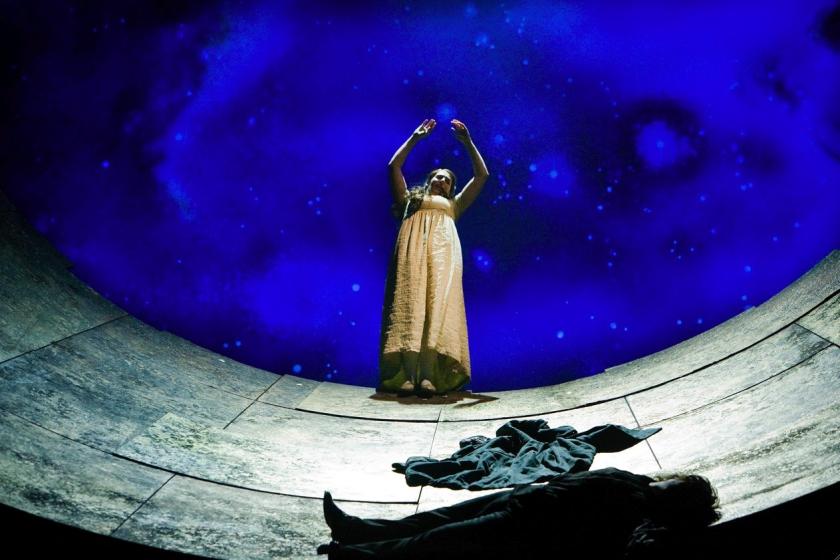Rarely have I seen an opera where so much of the activity, so much of the detailed business of relating, loving, falling out and hating, has rung so true for so much of the time. And never do I remember this truthfulness coming from such simplicity. For, in terms of set, costume and conception, this is a very ordinary, recognisable, dependable, 19th-century Tosca. But what soprano-cum-director Catherine Malfitano (once a star Tosca herself) does with these familiar ingredients is quite extraordinary.
We don't have to wait long for the first sign that Malfitano's handling of the drama will be special, the curtains rising on a palpitating cloak bent under the church sanctuary. We are, of course, glimpsing the crazed freedom-fighter Angelotti (the purring bass-baritone of Pauls Putninš), whose decision to steal himself away to the sacristy will lead to the massacre of the three leads. It's one of several chilling and slightly mysterious stills that haunt this production. Malfitano's next moment of brilliance is what gives the opera its heart beat: the love scene.
Oh boy, what a love scene. Usually there's something forced about the amount of time it takes for the embrace, the fallout and reconciliation of Tosca and Cavaradossi to work itself out. Here, it seemed like the most natural thing in the world. Malfitano has them both fly across the church after their row, sitting slumped on two opposing pillars, Cavaradossi slowly crawling back towards Tosca with entreaties, Tosca flirtatiously still. It's a stroke of genius to have them apart and restrained during this moment of high musical passion. Like two charged magnets you could almost see blue sparks flying between them.
With everything so deeply internalised, singers Julian Gavin (Cavaradossi) and Amanda Echalaz (Tosca) could concentrate on their voices and soar. The confidence with which Gavin opened the opera was breathtaking, his big, open, generous sound offering up a vision of complete freedom. Like Gavin, Echalaz too was big and generous with her lungs, but hers is a voice that follows the contours of the drama better than Gavin's, mutating in colour and texture as Scarpia whittles away her options.
The entry of Anthony Michaels-Moore's Scarpia upsets things more than a little, not just with their relationship, but with my relationship to the production. Sure, a dramatic energy was maintained - Scarpia kneeling on the sofa like a little kid just before his attempted rape of Tosca; Tosca sitting weakly on a chair watching Cavaradossi's torture - but rarely was this drama emanating from Michaels-Moore himself. In spite of some decent smiley-madman schtick, he couldn't quite sustain the full blackness of this role and his voice, though large, smudged things too often.
With the Third Act, we were back on form. There was plenty more quiet brilliance from Malfitano here - a chilling execution, a ghostly fall - and a bit of very loud brilliance from set designer Frank Philipp Schlössmann, whose realistic, lightly fragmented designs achieve a sort of Wagnerian apotheosis, with a stony U-bend framing nothing less than the cosmos itself, rendered in all its glistening, starry, gaseous finery.
Echalaz's voice grew more and more pitch-perfectly wild as the situation turned nasty. Malfitano's vision grew more and more meditative, everyone having a little gaze into the attractive heavens. And in the pit, conductor Edward Gardner drew out the most beautiful and tender playing from the ENO orchestra that I have ever heard. This was a Tosca at its plainest, simplest and most inspired.
- The ENO's new production of Tosca runs until 10 July
- Check out the 2009-2010 ENO season
- Check out the 2010-2011 ENO season














Add comment